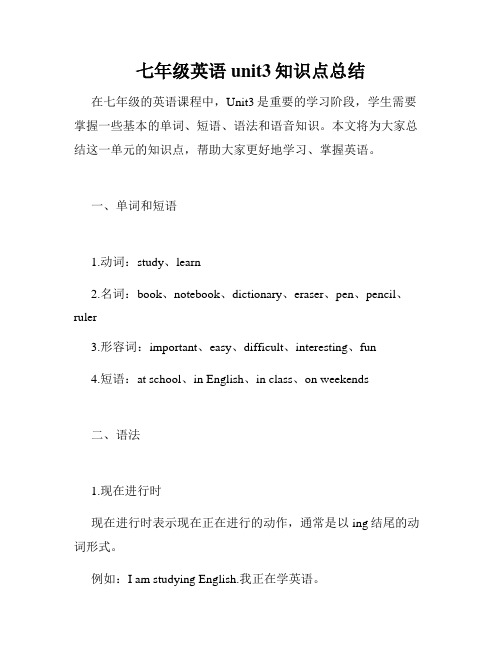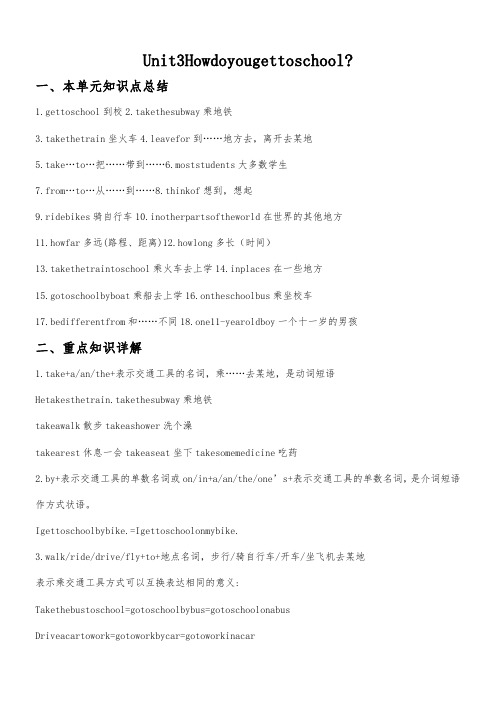七年级下册英语Unit3知识点总结
人教版七年级下册英语Unit 3 知识点语法归纳总结

人教版七年级下册英语Unit 3 知识点语法归纳总结Unit 3 How do you get to school?In this unit。
we will learn how to talk about n and how to describe our daily commute to school.1.Phrases to remember:Get to school: Arrive at schoolTake the subway: Use the subway as nRide a bike: Use a bicycle as nHow far: The distance een two placesFrom home to school: The distance een home and schoolEvery day: DailyTake the bus: Use the bus as nLeave Beijing for Shanghai: Depart from Beijing to Shanghaieful sentences:How do you get to school。
I ride my bike to school.How far is it from your home to school?How long does it take you to get to school?For many students。
it is easy to get to school.age:1) How to express n:How do you get to school?When describing n。
we usually use ns such as "by" (without "a/the").BusThink ofeen。
七年级下册英语知识点总结unit3

七年级下册英语知识点总结unit3 Unit 3是七年级下册英语中的重要章节,包括了关于“Where did you go on vacation?”话题的语言知识学习。
本文将总结这一单元中的主要知识点,帮助同学们学习和复习英语知识。
一、动词过去式在本单元中,我们学习了动词过去式的构成。
对于一般动词,加ed,如“ visit-visited”, “stay-stayed”,“rent-rented”等。
irregular verbs(不规则动词)不遵循这个规则,要在记忆时重点记忆这些例外动词的变形。
如“go-went”,“eat-ate”,“see-saw”等。
二、特殊疑问句的构造特殊疑问句也是本单元中的重点,我们学习了如何使用特殊疑问句来询问別人的去向。
特殊疑问句可以通过疑问词(如what, where, when, how)的询问构成,如 "Where did you go on vacation?", "When did you visit your grandparents?"等。
三、介词 at, in, on的区别和用法本单元中,我们也学习了介词at, in 和 on的区别和用法。
其中的细节是很重要的,因为这些介词的用法在表达时间和地点上是非常频繁的。
简单总结下,at 用于特定的时间点,如“at 9o'clock”,“at Christmas”, “at the party”, on 用于特定的日期或日子,例如“on Monday”,“on December 25th”,“on the weekend”, in 用于一段时间内,如“in June”,“in the afternoon”,“in summer”,“in 2019”。
四、冠词的使用本单元中我们也学习了冠词的用法。
不定冠词“a”和“an”用于表示单数可数名词,而定冠词“the”在特定情境下指特定的名词。
英语七年级下册Unit3-How do you get to school知识点

Unit 3 How do you get to school?一、本单元知识点总结1.get to school 到校2.take the subway 乘地铁3.take the train 坐火车4.leave for 到……地方去,离开去某地5.take…to…把……带到……6. most students 大多数学生7. from…to…从……到…… 8.think of 想到,想起9.ride bikes 骑自行车10.in other parts of the world 在世界的其他地方11. how far 多远(路程、距离) 12.how long多长(时间)13.take the train to school 乘火车去上学14.in places 在一些地方15.go to school by boat乘船去上学16.on the school bus乘坐校车17.be different from和……不同18.one 11-year old boy 一个十一岁的男孩二、重点知识详解1. take +a/an/the+表示交通工具的名词,乘……去某地,是动词短语He takes the train. take the subway乘地铁take a walk散步take a shower洗个澡take a rest休息一会take a seat 坐下take some medicine 吃药2.by+表示交通工具的单数名词或on/in+ a/an/the/one’s+表示交通工具的单数名词,是介词短语作方式状语。
I get to school by bike. = I get to school on my bike.3.walk/ride/drive/fly+to+地点名词,步行/骑自行车/开车/坐飞机去某地表示乘交通工具方式可以互换表达相同的意义:Take the bus to school=go to school by bus=go to school on a busDrive a car to work=go to work by car=go to work in a carFly to shanghai=go to shanghai by plane/air=take the/a plane to shanghai=go to shanghaion a/an/the plane.4.get表示“到达”,后接名词需加to,接地点副词不加to.reach 给示到达,是及物动词,其后直接接宾语。
七年级英语unit3知识点总结

七年级英语unit3知识点总结在七年级的英语课程中,Unit3是重要的学习阶段,学生需要掌握一些基本的单词、短语、语法和语音知识。
本文将为大家总结这一单元的知识点,帮助大家更好地学习、掌握英语。
一、单词和短语1.动词:study、learn2.名词:book、notebook、dictionary、eraser、pen、pencil、ruler3.形容词:important、easy、difficult、interesting、fun4.短语:at school、in English、in class、on weekends二、语法1.现在进行时现在进行时表示现在正在进行的动作,通常是以ing结尾的动词形式。
例如:I am studying English.我正在学英语。
2.一般现在时一般现在时表示经常、习惯性地发生的动作或状态。
例如:I go to school every day.我每天都上学。
3.人称代词人称代词是表示人的身份的代词,用来代替某个人或一组人。
例如:I(我)、you(你)、he(他)、she(她)、it(它)、we(我们)、they(他们)。
三、语音1.长音和短音长音和短音是英语中的两种基本发音方式,必须掌握。
例如:cat(短音)、cake(长音)2.重读音节在英语单词中,有些音节的发音比其他音节更强烈,这种音称为重读音节。
例如:computer(com-PUT-er)以上就是七年级英语Unit3的主要知识点总结,希望本文对大家的英语学习有所帮助。
在学习英语的过程中,要积极听、说、读、写,多练习,做到理论与实践相结合,才能在英语学习中获得更好的成就。
英语七年级下册Unit3-How do you get to school知识点

Unit3Howdoyougettoschool?一、本单元知识点总结1.gettoschool到校2.takethesubway乘地铁3.takethetrain坐火车4.leavefor到……地方去,离开去某地5.take…to…把……带到……6.moststudents大多数学生7.from…to…从……到……8.thinkof想到,想起9.ridebikes骑自行车10.inotherpartsoftheworld在世界的其他地方11.howfar多远(路程、距离)12.howlong多长(时间)13.takethetraintoschool乘火车去上学14.inplaces在一些地方15.gotoschoolbyboat乘船去上学16.ontheschoolbus乘坐校车17.bedifferentfrom和……不同18.one11-yearoldboy一个十一岁的男孩二、重点知识详解1.take+a/an/the+表示交通工具的名词,乘……去某地,是动词短语Hetakesthetrain.takethesubway乘地铁takeawalk散步takeashower洗个澡takearest休息一会takeaseat坐下takesomemedicine吃药2.by+表示交通工具的单数名词或on/in+a/an/the/one’s+表示交通工具的单数名词,是介词短语作方式状语。
Igettoschoolbybike.=Igettoschoolonmybike.3.walk/ride/drive/fly+to+地点名词,步行/骑自行车/开车/坐飞机去某地表示乘交通工具方式可以互换表达相同的意义:Takethebustoschool=gotoschoolbybus=gotoschoolonabusDriveacartowork=gotoworkbycar=gotoworkinacarFlytoshanghai=gotoshanghaibyplane/air=takethe/aplanetoshanghai=gotoshanghaiona/an/the plane.4.get表示“到达”,后接名词需加to,接地点副词不加to.reach给示到达,是及物动词,其后直接接宾语。
新目标英语七年级(下)Unit_3知识要点归纳

知【重点词汇】train火车subway 地铁ride 骑旅程minute 分钟far &远;远的kilometer千米;公里new 新的;刚出现的drive 开车live 生活;居住stop 车站停止cross 横过;越过afraid 害怕的;畏惧的leave 离开dream 梦想;睡梦true 真的;符合事实的bridge 桥take the subway 乘地铁ride a bike 骑自行车how far 多远how long 多长时间walk to school 步行去上学get to school 到校by bus 乘公汽by bike 骑自行车by train 乘坐火车by boat 乘坐小船cross the river 过河come true 实现;成为现实【重难点句子】1.It takes sb.some time to do sth.花费某人一段时间去做某事例如:It takes me twenty minutes to get to school on foot every morning.我每天早上花20分钟步行到学校。
☆take 还有“乘;坐”之意例如:Shall we go by bus or take a cab?我们是乘公共汽车去还是乘出租去?2.The bus ride is never boring because I always talk to my classmates.坐公交车从不会无聊,因为我总是跟同学们聊天。
在这句话中ride 是名词,表示“行程”。
How 引导的特殊疑问句3.用How do you...?询问别人做某事的方式。
回答可以用by sth.或take sth.的结构。
4.How far 引导的特殊疑问句用来询问两地之间的距离。
34Copyright ©博看网. All Rights Reserved.。
七年级英语下册第三单元
七年级英语下册第三单元知识点总结一、词汇与短语1. 动词- have:拥有,具有。
例如:I have a new book.(我有一本新书。
)- collect:收集。
例如:She collects stamps.(她收集邮票。
)- play:玩,演奏。
例如:I play the piano.(我弹钢琴。
)- show:展示,给……看。
例如:Can you show me your photos?(你能给我看看你的照片吗?)2. 名词- thing:事物,东西。
例如:What's that thing over there?(那边那个东西是什么?)- hobby:爱好。
例如:My hobby is reading.(我的爱好是阅读。
)- club:俱乐部。
例如:He is a member of the basketball club.(他是篮球俱乐部的成员。
)- story:故事。
例如:I like listening to stories.(我喜欢听故事。
)3. 其他- a lot of:许多,大量。
例如:She has a lot of friends.(她有很多朋友。
)- in one's free time:在某人的空闲时间。
例如:I often read books in my free time.(我经常在空闲时间读书。
)- be interested in:对……感兴趣。
例如:I'm interested in science.(我对科学感兴趣。
)二、语法与句型1. 一般现在时- 描述经常发生的动作或存在的状态。
例如:I usually go to school by bike.(我通常骑自行车上学。
)- 第三人称单数形式的变化:动词后加-s或-es。
例如:He watches TV every day.(他每天都看电视。
)2. 特殊疑问句- 结构:特殊疑问词+ 一般疑问句。
人教版七年级下册英语第三单元知识点归纳
人教版七年级下册第三单元知识点归纳Unit 3 How do you get to school?◆短语归纳1. get to school 到达学校 ride a bike 骑自行车 4. 20minutes ' wa 二lk 十分钟的步行 5. from home to school 从家到学校 6. every day 每天7. take the bus 乘公共汽车 8. by bike 骑自行车 9. bus stop 公共汽车站10. think of 认为 11. between ⋯ and 在⋯ 和⋯之间 12. one 11-year-old boy 一个 11岁的男孩 13. play with ⋯和 ⋯玩 14. come true 实现 15. have to 不得不 16.take the train to school 乘火车去上学 17.leave for 到 地方去 离开去某地 18.I ‘ma fraid 恐怕 19.look like看起来像20.sound like 听起来像 21.from ⋯to ⋯从,,到,, 21.every one 每一个22.everyone 每个人 23. how far 多远 24.go to school by boat 乘船去上学25.on the school bus 乘坐校车 26.be different from 和,,不同 27. worry about 担忧 焦虑 担心 28. take sb. some time to do sth. 花费某人某些时间去做某事 29. thanks for 因⋯⋯感谢你 30.stop listening to music 停止听音乐31. two hundred students 二百名学生 3 2. hundreds of studengs 数百名 学生33. stop to listen to music 停下去听音乐 34. bus station 汽车 站35. live in a small village 住在一个小村子里 36. dream to do sth 梦想做某事37. .I'm not sure. 我不能确信。
七下英语人教版第三单元笔记
七下英语人教版第三单元笔记 Unit 3 Notes.Section 1: A Trip to the Zoo.Vocabulary:animal (动物)。
zoo (动物园)。
tiger (老虎)。
lion (狮子)。
elephant (大象)。
giraffe (长颈鹿)。
monkey (猴子)。
bird (鸟)。
fish (鱼)。
Grammar:Simple Present Tense (一般现在时)。
Present Continuous Tense (现在进行时)。
Section 2: Animals and Their Homes.Vocabulary:habitat (栖息地)。
forest (森林)。
grassland (草原)。
desert (沙漠)。
ocean (海洋)。
river (河流)。
lake (湖泊)。
Grammar:Prepositions of Place (方位介词)。
Section 3: Animal Behavior.Vocabulary:behavior (行为)。
instinct (本能)。
learned behavior (习得行为)。
communication (交流)。
migration (迁徙)。
Grammar:Modal Verbs (情态动词)。
Section 4: Animal Conservation.Vocabulary:conservation (保护)。
endangered species (濒危物种)。
habitat destruction (栖息地破坏)。
pollution (污染)。
poaching (偷猎)。
Grammar:Passive Voice (被动语态)。
中文回答:第一单元,动物园之旅。
词汇:动物(animal)。
动物园(zoo)。
老虎(tiger)。
狮子(lion)。
大象(elephant)。
长颈鹿(giraffe)。
[全]人教版七年级英语下册unit3单词、知识梳理、词汇句型精讲
人教版七年级英语下册unit3单词、知识梳理、词汇句型精讲Unit3 How do you get to school?1Unit 3单词(音标)train [tren] n.火车bus [bs] n.公共汽车;公交车subway ['sbwe] n.地铁take the subway 乘地铁ride [rad] v.骑n.旅程bike [ba k] n. 自行车ride a bike 骑自行车sixty ['skst] num.六十seventy ['sevnt] num.七十eighty ['et] num.八十ninety['nant] num.九十hundred ['hndrd] num.一百minute['mnt] n.分钟far [fɑ] adv. & adj. 远;远的kilometer ['kl,mit(r)] n.公里new [nju] adj. 新的;刚出现的every ['evr] adj. 每一;每个every day 每天by [ba] prep. (表示方式)乘(交通工具)by bike 骑自行车drive [drav] v. 开车car [kɑ] n.小汽车;轿车live[lv] v. 居住;生活stop [stɑ:p][stp] n. 车站;v. 停止think of 认为cross [krs] v.横过;越过river ['rv] n.河;江many ['men] adj. & pron.许多village ['vld] n.村庄;村镇between [b'twin] prep.介于…之间between…and…在……和……之间bridge [brd] n.桥boat [bt] n.小船ropeway ['rpwe] n.索道year [j] [ j] n.年;岁afraid ['fred] adj.害怕;惧怕like [lak] prep.像;leave [liv] v.离开dream [drim] n.梦想;睡梦v.做梦true [tru] adj.真的;符合事实的come true实现;成为现实Dave[deiv] 戴夫(男名2 Unit3 知识梳理◆短语归纳1. get to school 到达学校2. take the subway 乘地铁3. ride a bike 骑自行车4. how far 多远5. from home to school 从家到学校6. every day 每天7. take the bus 乘公共汽车8. by bike 骑自行车9. bus stop 公共汽车站10. think of 认为11. between…and…在…和…之间12. one 11-year-old boy 一个11岁的男孩13.play with…和…玩14. come true 实现15. have to 不得不◆用法集萃1. take…to…= go to…by…乘…去…2. How do/does sb get to…? 某人是怎样到…的?3. How far is it from…to…? 从…到…有多远?4. It takes sb. some time to do sth. 做某事花费某人多长时间。
- 1、下载文档前请自行甄别文档内容的完整性,平台不提供额外的编辑、内容补充、找答案等附加服务。
- 2、"仅部分预览"的文档,不可在线预览部分如存在完整性等问题,可反馈申请退款(可完整预览的文档不适用该条件!)。
- 3、如文档侵犯您的权益,请联系客服反馈,我们会尽快为您处理(人工客服工作时间:9:00-18:30)。
Unit3 How do you get to school?
◆短语归纳
1. get to school 到达学校
2. take the subway 乘地铁
3. ride a bike 骑自行车
4. how far 多远
5. from home to school 从家到学校
6. every day 每天
7. take the bus 乘公共汽车
8. by bike 骑自行车
9. bus stop 公共汽车站
10. think of 认为
11. between…and…在…和…之间
12. one 11-year-old boy 一个11岁的男孩13.
play with…和…玩
14. come true 实现
15. have to 不得不
◆用法集萃
1. take…to…= go to…by…乘…去…
2. How do/does sb get to…? 某人是怎样到…的?
3. How far is it from…to…? 从…到…有多远?
4. It takes sb. some time to do sth. 做某事花费某人多长时间。
5. How long does it take to do sth.? …花费多长时间?
6. It is + adj. + to do sth. 做某事是…
7. Thanks for + n./Ving 感谢你(做)某事。
◆典句必背
1. —How do you get to school? 你怎么去上学?
—I ride my bike. 我骑自行车。
2. How far is it from your home to school? 从你家到学校有多远?
3. How long does it take you to get to school? 去上学花费你多久?
4. For many students, it is easy to get to school. 对很多学生来说,很容易到达学校。
5. There is a very big river between their school and the village. 在他们学校和村庄之间有一条很大的河流。
◆话题写作
主题:上学的交通方式
写作思路:②开篇点题:点出自己的出行方式;②具体内容:自己选择这种交通方式的原因;
③结束语: 表明自己的观点。
The Best Way for Me to Go to School
Different students go to school in different ways in our school, but I llike to go to school on foot.
First, I live near the school, so my home is not far from my school. And it takes me a few minutes to get there. Second, there is a crossing on my way to school, and sometimes the traffic is very busy. I think it is safer to go to school on foot. Third, I think walking is good for my health. It’s a kind of sport and it makes me study better.
So in my opinion, the best way to go to school is on foot. What about you?。
